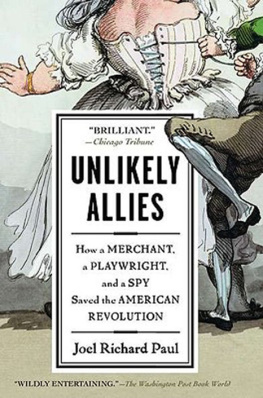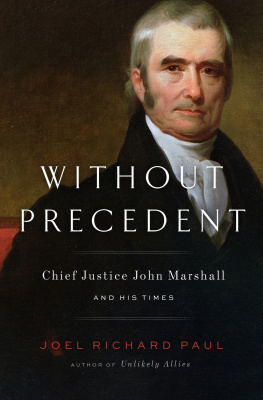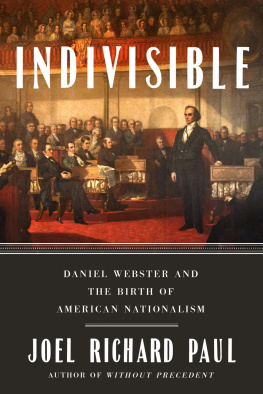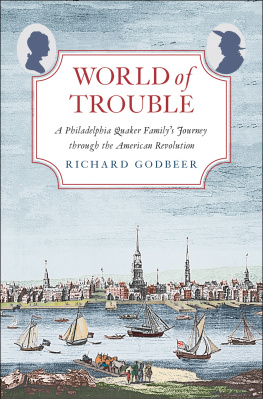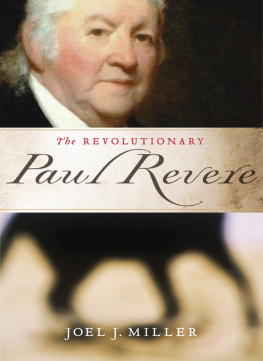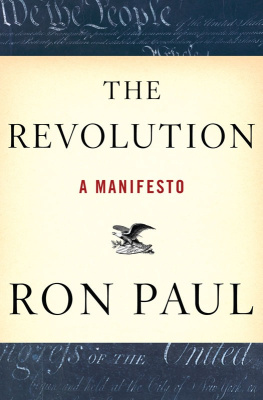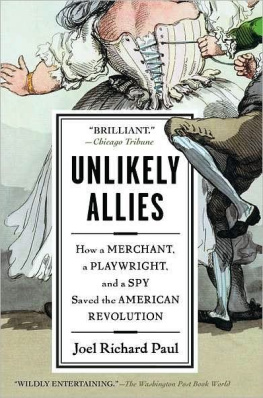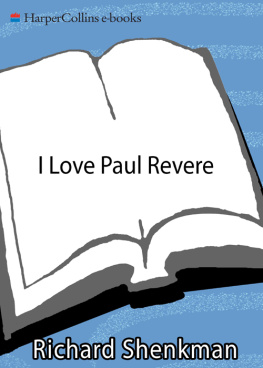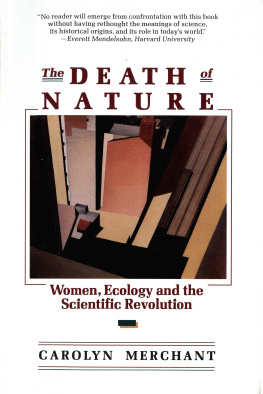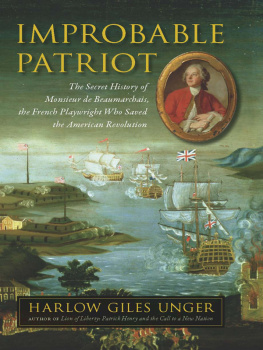ACKNOWLEDGMENTS
This is not the book I intended to write. I was writing a different book about the history of international law in the United States when I discovered Silas Deane. All that I knew about him was that a shopkeeper from Wethersfield, Connecticut, had shown up in Versailles to negotiate an alliance long before Benjamin Franklin or John Adams arrived in France. I was curious as to how that happened, but I could not find any serious books about Deane. I tried to find Deanes personal papers, assuming they had survived. I had no idea how to find diaries or letters of an obscure figure from the eighteenth century, so I phoned a friend, David Kahn, who was then the executive director of the Connecticut Historical Society to ask his advice. To my surprise David replied: We own his papers. He had only just discovered that fact a few weeks before when he came across some boxes left by Deanes descendants in the Connecticut Historical Society archives.
I flew to Hartford, Connecticut. The Connecticut Historical Society is located in a house adjacent to the University of Connecticut School of Law, where, coincidentally, I used to teach. The archivist showed me several boxes that looked as if they had not been opened in generations. I found letters to and from George Washington, Benjamin Franklin, John Adams, Thomas Jefferson, Louis XVI, John Jay, Robert Morris, Benedict Arnold, and many others. The story they revealed was an astonishing tale of innocence and intrigueidealism, struggle, betrayal, and survival. I was hooked. I put my other manuscript aside and began six years of research in the United States, France, and England, and an enduring relationship with Deane, Beaumarchais, and dEon.
My research was greatly facilitated by the library staff at the U.C. Hastings College of the Law, especially Vince Moyer, who can find anything. My research assistants, Jean-Paul Buchannan, Stephen Miller, Ryan McCord, Chris Nolan, and Jakob Zollmann tolled many hours with microfiche and old manuscripts, helping me to uncover the full story. And Simona Angelucci, Jennifer Holly, Sophie Hub scher, Natacha Ivacheff-Kolb, Pauline Marcel, and Leo Spanos helped translate many of the documents from the archives of La ministre des Affaires trangres in Paris.
Professors Robert Gross, Reuel Schiller, and William Taubman generously read drafts of my manuscript and helped me to sharpen my focus. I owe a special debt to Professor Gross, who first inspired my interest in the American Revolution in his class at Amherst College. Simon Burrows, Jonathan Conlin, Gary Kates, James Lander, Linda Meditz, Kenneth Minkema, Brian Morton, Donald Spinelli, and Douglas Winiarski were kind enough to share with me some of their historical expertise. Amber Cushing, Librarian at the New Hampshire State Archives; Lesley Whitelaw, Archivist of the Middle Temple; Jeff Collins, the archivist at the First Congregational Church of Wethersfield; Charles Lyle, the director of the Webb-Deane-Stevens Museum in Wethersfield; photographer Ruth Hanks; and Mathieu da Vinha, Coordinator of the Research Center at the Chteau de Versailles were also very helpful.
I am grateful to my literary agent, Doe Coover, and to my editor, Jake Morrissey, for giving an unknown writer a chance to tell an unfamiliar story. Sarah Bowlin, Ed Cohen, Claire McGinnis, and Kate Moreau were wonderful to work with at Riverhead. And I appreciate the generous support of my patient colleagues at the U.C. Hastings College of the Law, especially Deans Mary Kay Kane, Shauna Marshall, and Nell Newton.
I was blessed with great friends who thoughtfully commented on many drafts, pushed me to do better, and sustained me for six years, including Corky Ellis, Bob Graubard, David Friend, Mark Hager, Elise Kroeber, Jane Shulman, James Sloan, Bertrand Vandeville, and Linden Wise. My friend and publicist Jan Saragoni Bradley and my consultant Roger Williams were invaluable. I am especially grateful to my friend and talented mentor Paul Aron, who spent countless hours advising, editing, and encouraging me through the whole process of this book, and to Rick Steele and Susan Nance, who helped me to find my voice.
I hope my effort is worthy of your confidence, friendship, and support.
BIBLIOGRAPHY
I am grateful to the following institutions and libraries for allowing me access to their holdings:
Amherst College Library
Archive de la ministre des affaires trangres, Quai dOrsay
Bancroft Library, University of California at Berkeley
Beinecke Library of Yale University
Bibliothque nationale de France
British Library Manuscript Reading Room
Connecticut Historical Society
Harvard University Library
Library of Congress Manuscript Reading Room
Lincolns Inn Archives
Middle Temple Archives
New Hampshire State Archives
New York Public Library
San Francisco Public Library
State of Connecticut Archives
COLLECTED PAPERS
Adams, John. The Works of John Adams. Vol. 2. Edited with an introduction by Charles Francis Adams. Boston: Little, Brown, and Co., 1865.
. The Diary and Autobiography of John Adams. Edited by Lyman Henry Butterfield. 4 vols. Cambridge, Mass.: Belknap Press of Harvard University, 1961.
Beaumarchais, Pierre-Augustin Caron de. La politique de Beaumarchais. Microform edited by Jacques Donvez, 1900.
. Correspondance. 4 vols. Edited by Brian N. Morton and Donald Spinelli. Paris: A.-G. Nizet, 1969.
Beaumont, Charles dEon de. The Maiden of Tonnerre: The Vicissitudes of the Chevalier and the Chevalire dEon. Edited and translated by Roland A. Champagne, Nina Ekstein, and Gary Kates. Baltimore: Johns Hopkins University Press, 2001.
Colonial Connecticut Records, 1636-1776. The Colonial Connecticut Records Project. http://www.colonialct.uconn.edu.
Continental Congress. Journals of the Continental Congress 1774-1789. Washington, D.C.: Government Printing Office, 1905.
Cushing, Harry Alonzo, ed. The Writings of Samuel Adams. 4 vols. 1904-1908. Reprint, New York: Octagon Books, 1968.
Deane, Silas. The Paris Papers; or, Mr. Silas Deanes Late Intercepted Letters to His Brothers, and Other Intimate Friends, in America. Reprint by James Rivington, New York: Livingston, 1782.
. The Silas Deane Papers, 1740-1782. Series 5: Memorials to Congress, 1835. Connecticut Historical Society.
. The Deane Papers, 1737-1789. Edited and translated by Charles Isham. 5 vols. New York: New-York Historical Society Collections, 1886.
. The Deane Papers: Correspondence Between Silas Deane, His Brothers and Their Business and Political Associates, 1771-1795. Collections of the Connecticut Historical Society 23. Hartford, Conn.: 1930.
Doniol, Henri. Histoire de la participation de la France ltablissement des Etats-Unis dAmrique. Correspondance diplomatique et documents. 6 vols. Paris: Imprimerie nationale, 1886-1889.
Franklin, Benjamin. The Papers of Benjamin Franklin. Edited by William B. Willcox, vols. 15, 17-26; edited by Claude A. Lopez, vol. 27. New Haven: Yale University Press, 1984.
Hutchinson, Thomas. The Diary and Letters of His Excellency Thomas Hutchinson. Edited by Peter Orlando Hutchinson. 2 vols. 1884-1886. Reprint, New York: Burt Franklin, 1971.
George III. The Correspondence of King George III from 1760 to December 1783. Edited by Sir John Fortescue. Vols. 1-6. London: Macmillan and Co., 1927-1928.
Jay, John. The Correspondence and Public Papers of John Jay, 1763-1826. Edited by Henry P. Johnson. New York: Da Capo Press, 1971.

